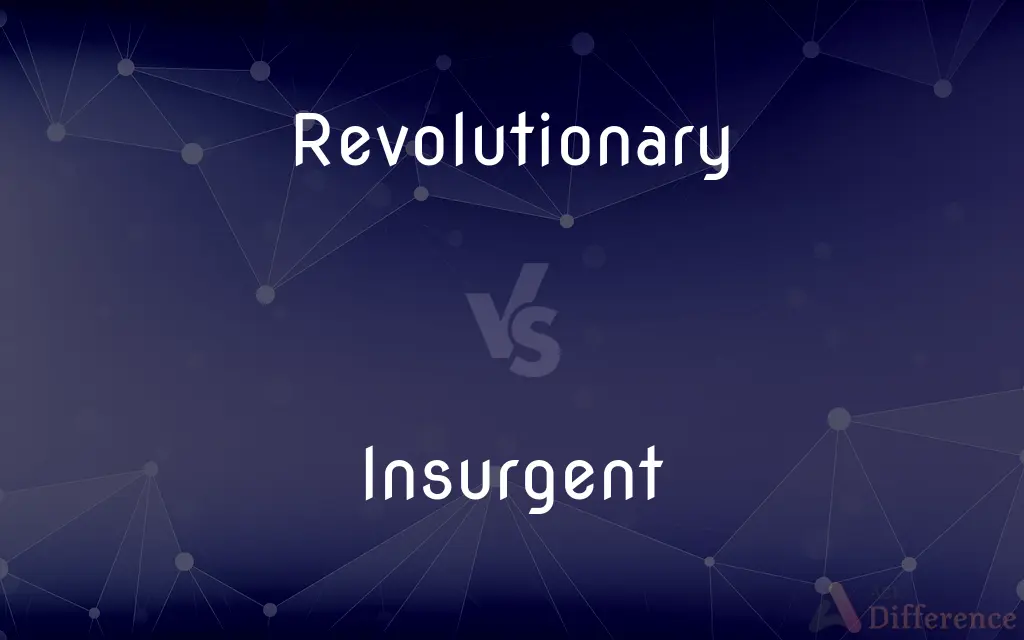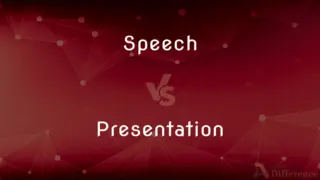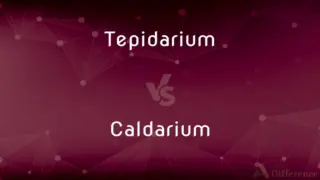Revolutionary vs. Insurgent — What's the Difference?
By Maham Liaqat & Urooj Arif — Updated on May 4, 2024
Revolutionary often denotes someone advocating complete political or social reform, whereas an insurgent specifically fights against an established government.

Difference Between Revolutionary and Insurgent
Table of Contents
ADVERTISEMENT
Key Differences
A revolutionary aims for significant change or the overthrow of a current system, focusing on broad ideological goals. In contrast, an insurgent is primarily involved in an active rebellion, emphasizing direct action against an existing authority. Both share an oppositional stance, but their methods and objectives can differ significantly.
Revolutionary movements are usually organized with a clear ideological framework that seeks systemic change, which can be social, political, or economic. On the other hand, insurgents may operate within a more limited scope, targeting specific grievances or local control, often without a broader ideological agenda.
The term "revolutionary" can apply to individuals advocating for radical changes in various sectors such as technology, culture, or academia, broadening its usage beyond mere political context. Insurgents, however, are almost exclusively associated with military or paramilitary activities against a sovereign power or occupying force.
Historically, revolutionaries have sometimes transitioned into official roles post-revolution, as seen in various national leaders who emerged from revolutionary movements. Conversely, insurgents typically remain oppositional figures unless they achieve complete victory and re-establish governance structures.
In literature and popular media, revolutionaries are often portrayed as visionary heroes, whereas insurgents might be depicted as gritty anti-heroes or outright antagonists, reflecting their more militaristic and confrontational methods.
ADVERTISEMENT
Comparison Chart
Definition
Advocates for complete overhaul of a system
Participates in an active rebellion
Scope
Can be broad: political, social, cultural
Often narrower, focused on specific conflicts
Methods
Organized, ideological
Militaristic, tactical
Association
Often with broader ideological movements
Primarily with specific rebellions
Cultural Representation
Visionary heroes, agents of change
Gritty anti-heroes, confrontational fighters
Compare with Definitions
Revolutionary
An advocate for sweeping systemic change.
The revolutionary proposed a new form of government that promised equality for all.
Insurgent
A rebel fighting against established authority.
The insurgents launched a surprise attack at dawn.
Revolutionary
A person who supports radical change in society.
As a revolutionary, she campaigned against centuries-old social norms.
Insurgent
A member of a group involved in conflict.
As an insurgent, he operated in the shadows to evade capture.
Revolutionary
Someone innovating in technology or art.
His revolutionary ideas redefined the genre of digital art.
Insurgent
Someone actively participating in an uprising.
The insurgent was adept at guerrilla tactics.
Revolutionary
An individual pushing for drastic reforms.
The professor was known as a revolutionary in educational methods.
Insurgent
A participant in a movement resisting occupation.
Insurgents in the region had the support of the local population.
Revolutionary
A member of a movement aiming to overthrow a system.
The revolutionary was prepared to sacrifice everything for the cause.
Insurgent
An individual challenging the status quo through conflict.
The insurgent's role was crucial in the resistance movement.
Revolutionary
A revolutionary is a person who either participates in, or advocates a revolution. Also, when used as an adjective, the term revolutionary refers to something that has a major, sudden impact on society or on some aspect of human endeavor.
Insurgent
Rising in revolt against a government or other established authority.
Revolutionary
Often Revolutionary Relating to or being a revolution
Revolutionary war.
A museum of the Revolutionary era.
Insurgent
Rebelling against the leadership of a political party.
Revolutionary
Bringing about or supporting a political or social revolution
Revolutionary pamphlets.
Insurgent
One who is insurgent.
Revolutionary
Marked by or resulting in radical change
A revolutionary discovery.
Insurgent
Rebellious, opposing authority.
Revolutionary
A militant in the struggle for revolution.
Insurgent
Of water: surging or rushing in.
Revolutionary
A supporter of revolutionary principles.
Insurgent
One of several people who take up arms against the local state authority; a participant in insurgency.
Revolutionary
Of or pertaining to a revolution in government; tending to, or promoting, revolution
Revolutionary war
Revolutionary measures
Revolutionary agitators
Insurgent
Rising in opposition to civil or political authority, or against an established government; insubordinate; rebellious.
Revolutionary
Pertaining to something that portends of great change; overthrowing a standing mindset
A revolutionary new tool
Insurgent
A person who rises in revolt against civil authority or an established government; one who openly and actively resists the execution of laws; a rebel.
Revolutionary
(sciences) pertaining to something that revolves
Insurgent
A person who takes part in an armed rebellion against the constituted authority (especially in the hope of improving conditions)
Revolutionary
A revolutionist; a person who revolts.
Insurgent
A member of an irregular armed force that fights a stronger force by sabotage and harassment
Revolutionary
Of or pertaining to a revolution in government; tending to, or promoting, revolution; as, revolutionary war; revolutionary measures; revolutionary agitators.
Insurgent
In opposition to a civil authority or government
Revolutionary
A revolutionist.
Dumfries was a Tory town, and could not tolerate a revolutionary.
Revolutionary
A radical supporter of political or social revolution
Revolutionary
Markedly new or introducing radical change;
A revolutionary discovery
Radical political views
Revolutionary
Relating to or having the nature of a revolution;
Revolutionary wars
The Revolutionary era
Revolutionary
Advocating or engaged in revolution;
Revolutionary pamphlets
A revolutionary junta
Common Curiosities
What defines a revolutionary?
A revolutionary is defined by their advocacy for radical, systemic change in society, politics, or another field.
How do revolutionaries and insurgents differ in objectives?
Revolutionaries often aim for wide-ranging systemic changes, while insurgents typically focus on overthrowing specific authorities or redressing particular grievances.
What are common tactics of insurgents?
Insurgents commonly employ guerrilla tactics, sabotage, and other forms of asymmetrical warfare.
Can revolutionaries be considered insurgents?
While revolutionaries can engage in insurgent activities, the terms are not always interchangeable as their scopes and objectives often differ.
What motivates a revolutionary?
Revolutionaries are often motivated by ideological beliefs, seeking to fundamentally alter societal structures, governance, or economic systems according to specific principles or visions.
What is an insurgent known for?
An insurgent is known for actively participating in rebellions or conflicts against an established authority or government.
Are insurgents always part of a larger group?
While insurgents typically operate within groups to effectively challenge established authorities, there are instances of lone actors or small cells acting independently within larger movements.
Do revolutionaries always use violence?
Not necessarily. Revolutionaries can advocate for change through peaceful methods, such as civil disobedience or political reform, though some may resort to violent tactics.
What leads someone to become an insurgent?
Individuals become insurgents often due to political oppression, foreign occupation, or severe social injustices that compel them to take up arms in a struggle for change or self-determination.
Can revolutionaries be part of a government?
Yes, revolutionaries can transition into governmental roles after achieving their goals, particularly if their movement gains sufficient support to form or influence government structures.
What is the typical public perception of revolutionaries?
Public perception of revolutionaries can vary widely, from viewing them as heroes and visionaries to seeing them as radicals and troublemakers, depending on the context and outcomes of their actions.
Do insurgents seek to gain political power?
Insurgents may seek to gain political power as a means to achieve specific goals or reforms, but their primary focus is usually on weakening or overthrowing an existing authority rather than governance.
How do governments typically respond to revolutionaries?
Governments may respond to revolutionaries with legal reforms, negotiations, or concessions if the movement is largely peaceful, or with suppression and military action if it poses a significant threat to the status quo.
How do governments typically respond to insurgents?
Insurgents are generally met with military force, law enforcement actions, and counterinsurgency operations aimed at dismantling their capabilities and restoring state control.
What is the typical public perception of insurgents?
Insurgents are often perceived negatively, particularly by those loyal to the existing government, but may be seen as freedom fighters or defenders by their supporters and communities.
Share Your Discovery

Previous Comparison
Speech vs. Presentation
Next Comparison
Tepidarium vs. CaldariumAuthor Spotlight
Written by
Maham LiaqatCo-written by
Urooj ArifUrooj is a skilled content writer at Ask Difference, known for her exceptional ability to simplify complex topics into engaging and informative content. With a passion for research and a flair for clear, concise writing, she consistently delivers articles that resonate with our diverse audience.
















































